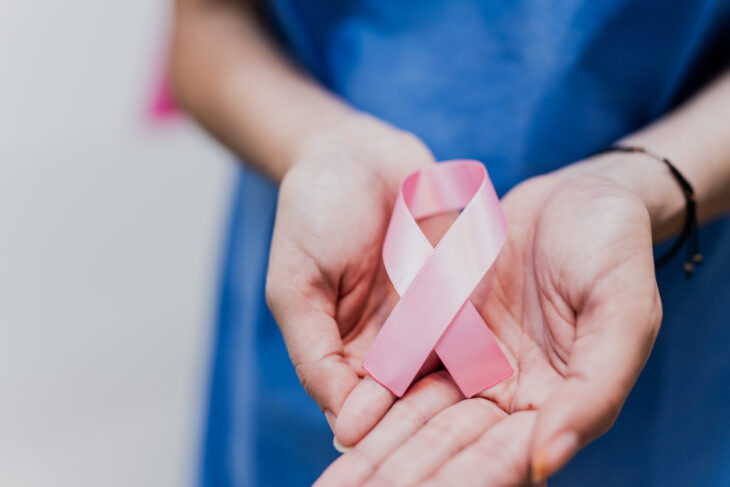
A breast cancer diagnosis is overwhelming. Endless thoughts loop through your mind as you consider all the information and uncertainties surrounding your prognosis. In the midst of the expected concerns like “which treatment is best for my diagnosis?”, “How will I feel?”, and “What does my future look like?” You may wonder how your breast cancer affects your fertility and the chance of having future children.
Compromised fertility doesn’t impact all women undergoing treatment for breast cancer. Depending on your diagnosis, your treatment may not warrant taking steps to preserve your fertility. However, women who receive a breast cancer diagnosis should anticipate a discussion with their oncologist about fertility and how their specific treatment impacts their reproductive future.
Breast cancer itself doesn’t typically affect fertility. However, the treatment plan you and your oncologist set forth may have lasting side effects that can cause infertility. The type of breast cancer with which you’ve been diagnosed and the stage of your breast cancer dictate your best treatment opportunities. Your priority right now is treating your cancer, but there are ways to preserve your fertility for a future family.
Different Types of Breast Cancer Treatment
There have been some amazing strides made in breast cancer research in recent years, and these advancements bring many more options for treating the disease than ever before. Not all treatment options impact your fertility, and some affect your future childbearing in different ways. While each individual diagnosis dictates the best type of care for you, here are the most common treatments for breast cancer and how they impact your fertility.
Surgery
Treating your breast cancer with surgery, usually a lumpectomy or mastectomy, does not typically cause infertility. And if your doctor finds your breast cancer early enough, surgery may be the only treatment you need. Discuss your options with your doctor, and together you can determine whether surgery alone treats your breast cancer.
Chemotherapy
When considering cancer treatment, most people immediately think “chemo”. If your doctor determines chemotherapy is the best course of treatment for you, the effects on your fertility may be temporary or could be permanent. The chemotherapy drugs can damage your ovaries to the extent that you enter premature menopause. At this point, you’ll likely stop ovulating. When you no longer ovulate, you won’t conceive naturally.
Hormone Therapy
Hormone therapy is one component in breast cancer treatment and may impact your most fertile years. Hormone receptor-positive (HR+) breast cancer often responds best to hormone therapy, typically the aromatase inhibitors (AI). AIs block estrogen as the hormone causes HR+ cancers to accelerate and grow. But estrogen is necessary for ovarian function and ovulation. While the impact on your ovaries isn’t usually permanent, you may need to take the medication for several years, which may interrupt fertility at “prime time”.
Radiation
Doctors use high-energy radiation to target cancer cells in specific regions of the body. Radiation for breast cancer won’t typically reach your pelvic region, so the impact on your fertility isn’t usually a concern.
Bilateral Oophorectomy
For those women with a genetic component to their breast cancer, your doctor may advise a bilateral oophorectomy, which is the removal of your ovaries. You can’t ovulate without ovaries, so this treatment directly impacts your fertility.
What Can I Do to Protect and Preserve my Reproductive Future?
There are steps you can take, with the help of a fertility specialist, to preserve or protect your future family planning. Of course, you need to consult before you begin your breast cancer treatment. If you are actively trying to conceive, you need to stop immediately. Here are the best ways to preserve and protect your fertility while undergoing treatment for breast cancer.
Egg Freezing
With your oncologist’s approval, egg freezing offers a way to preserve your fertility for the future. You’ll need a few weeks before starting cancer treatment, during which time your fertility specialist prescribes a course of medications to stimulate your ovaries to produce several eggs at one time. The doctor retrieves your eggs and places them in a solution that preserves them while frozen.
When you decide the time is right, you undergo IVF using your previously frozen egg and your partner’s (or donor’s) sperm.
Embryo Freezing
Embryo freezing is just like egg freezing, but with an extra step. Your fertility doctor prescribes a medication that stimulates your ovaries. They retrieve the eggs and send them to the lab, where the embryologist uses your partner’s sperm to fertilize the eggs. If you choose, your embryos may undergo preimplantation genetic testing (PGT), and the embryologist selects the most viable and healthiest embryos for preservation.
Because of PGT, freezing your embryos has a higher success rate than freezing your eggs. It can be difficult for those women who don’t have a partner and don’t want to proceed using donor sperm. Also, depending on your breast cancer diagnosis, the two-to-six-week process, or the hormonal stimulation, may not be advisable.
Protecting Your Ovaries
In the case of chemotherapy treatment, it may be possible to protect your ovaries and preserve ovarian function. Gonadotropin-releasing hormone medication halts ovarian function temporarily, shutting down egg production while you undergo chemotherapy to treat your breast cancer. Not only does this medication help preserve ovarian function for the future, but it also shuts down the production of certain hormones that may cause hormone stimulation of certain cancer cells in some breast cancers.
Put Your Future Fertility in Our Hands and Get Well
If you receive a breast cancer diagnosis, please contact LA IVF as soon as possible. We, together with your oncologist, will find options to protect your fertility and future family. Our compassionate doctors and staff understand how overwhelmed you feel, and we’ll do everything we can to ease your concerns about your future fertility while you concentrate on the road ahead.









